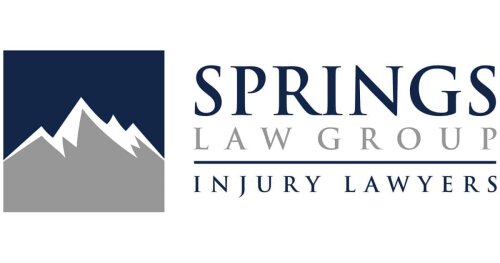Best Class Action Lawyers in Colorado
Share your needs with us, get contacted by law firms.
Free. Takes 2 min.
Or refine your search by selecting a city:
List of the best lawyers in Colorado, United States

About Class Action Law in Colorado, United States
Class action lawsuits in Colorado allow a group of people who have experienced similar harm or loss to collectively sue a person, company, or entity in court. This legal process is designed to help individuals seek justice efficiently, especially when individual claims might be too small to pursue on their own. Class actions in Colorado can address a variety of issues such as consumer protection, employment law, defective products, securities fraud, and environmental harm. The goal of a class action is to resolve common legal or factual questions for all members of a defined group, or "class," through one consolidated legal process.
Why You May Need a Lawyer
Class action cases often involve complex legal and procedural rules. You may need a class action lawyer in Colorado if you have suffered a similar injury or loss as a larger group from the actions of a business, employer, or other entity. Common situations include being charged hidden fees by a company, working under unfair employment practices, being sold a defective product, or experiencing environmental pollution.
Lawyers experienced in class action law can help you determine if your situation qualifies for a class action, explain your options, ensure you comply with legal deadlines, and represent your interests both during negotiations and in court. They can also help protect you from retaliation, calculate potential damages, and guide you through the certification process required to move forward with a class action suit in Colorado.
Local Laws Overview
Class action lawsuits in Colorado are governed by both state and federal law. At the state level, the Colorado Rules of Civil Procedure Rule 23 outlines how class actions must proceed in state courts. Important aspects include requirements for certification of the class, notice to all potential class members, and approval of settlements by the court. To proceed as a class action, the following must be established:
- The group, or class, is so large that individual lawsuits would be impractical (numerosity).
- There are common legal or factual issues shared by all members (commonality).
- The claims or defenses of the representative parties are typical of the class (typicality).
- The representative parties will protect the interests of the class (adequacy).
Federal rules may apply if the class action involves federal law or is filed in a federal court. Colorado courts also observe special notice requirements, and settlement agreements must be approved by the court. Colorado law provides consumer protection statutes that are frequently the basis for class action suits, such as the Colorado Consumer Protection Act.
Frequently Asked Questions
What is a class action lawsuit?
A class action lawsuit is a legal case where one or more people represent a larger group with similar claims against the same defendant, allowing all members to benefit from a single court case.
How do I know if I am part of a class action?
You may receive a notice informing you that you are part of a class action, usually by mail or email. If you believe you have experienced the same type of harm as described in a class action, you can contact the lawyers handling the case to see if you qualify.
What are common reasons for class actions in Colorado?
Common reasons include consumer fraud, unfair business practices, wage and hour violations, defective products, discrimination, securities fraud, and environmental harm.
How is compensation determined in a class action?
Compensation is typically divided among class members based on the extent of harm they suffered, as determined by the settlement agreement or court judgment.
Can I sue on my own instead of joining a class action?
Yes, you often have the option to opt out of a class action and pursue your own claim, but you should discuss the benefits and drawbacks with a legal professional.
Does it cost anything to join a class action lawsuit?
Class action lawyers typically work on a contingency fee basis, meaning you do not pay upfront. They receive a percentage of any settlement or award the class wins.
What is the process for starting a class action in Colorado?
A lawsuit is filed by a representative plaintiff and the court must certify the case as a class action based on meeting certain requirements. All potential class members are then notified about the lawsuit.
How long do class action cases take in Colorado?
Class actions can take anywhere from several months to several years, depending on the complexity of the case and whether it settles or goes to trial.
Are settlements in class actions always approved?
No, settlements must be approved by the court. The judge will review the fairness, reasonableness, and adequacy of proposed settlements before giving approval.
Can I be retaliated against for joining a class action?
It is illegal for employers or others to retaliate against you for participating in a class action. If you experience retaliation, you have additional legal protections under state and federal law.
Additional Resources
For more information or to seek assistance regarding class action lawsuits in Colorado, consider these resources:
- Colorado Judicial Branch - Offers guidance on civil procedure and court processes
- Colorado Office of the Attorney General - Provides information on consumer protection
- Colorado Bar Association - Can help you find qualified attorneys and legal clinics
- Legal Aid organizations in Colorado - Support for those who qualify based on income
- United States District Court for the District of Colorado - For federal class action cases
Next Steps
If you believe you are part of a group harmed by the same individual or entity, gather all documentation that supports your case, such as receipts, contracts, written communications, or other proof of harm. Contact a lawyer experienced in class action law for a consultation. They can review your situation, explain your rights, and determine if your claim may be suitable for a class action lawsuit. It is important to act quickly because legal deadlines, known as statutes of limitations, can limit your ability to file or join a class action. Reaching out to a local bar association or legal aid organization can be a helpful first step, especially if you are unsure how to find a qualified attorney.
Lawzana helps you find the best lawyers and law firms in Colorado through a curated and pre-screened list of qualified legal professionals. Our platform offers rankings and detailed profiles of attorneys and law firms, allowing you to compare based on practice areas, including Class Action, experience, and client feedback.
Each profile includes a description of the firm's areas of practice, client reviews, team members and partners, year of establishment, spoken languages, office locations, contact information, social media presence, and any published articles or resources. Most firms on our platform speak English and are experienced in both local and international legal matters.
Get a quote from top-rated law firms in Colorado, United States — quickly, securely, and without unnecessary hassle.
Disclaimer:
The information provided on this page is for general informational purposes only and does not constitute legal advice. While we strive to ensure the accuracy and relevance of the content, legal information may change over time, and interpretations of the law can vary. You should always consult with a qualified legal professional for advice specific to your situation.
We disclaim all liability for actions taken or not taken based on the content of this page. If you believe any information is incorrect or outdated, please contact us, and we will review and update it where appropriate.
Browse class action law firms by city in Colorado
Refine your search by selecting a city.










